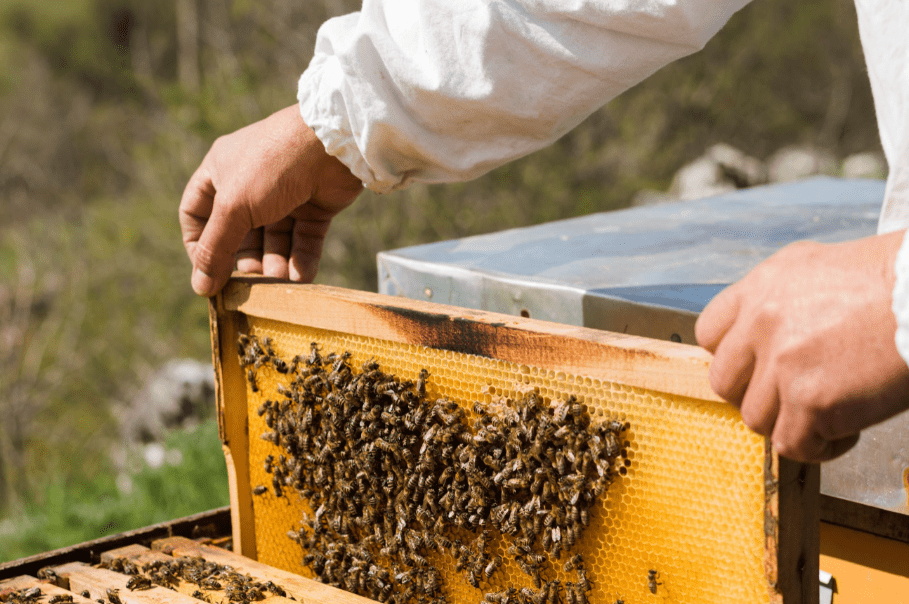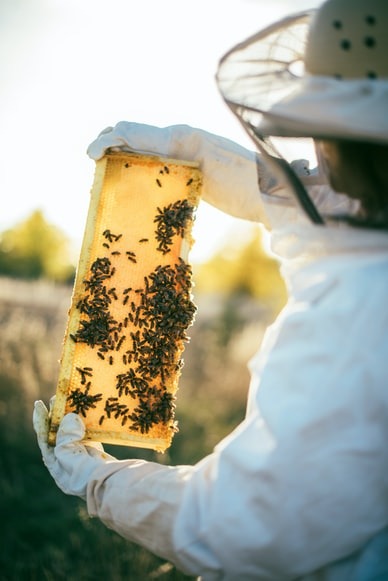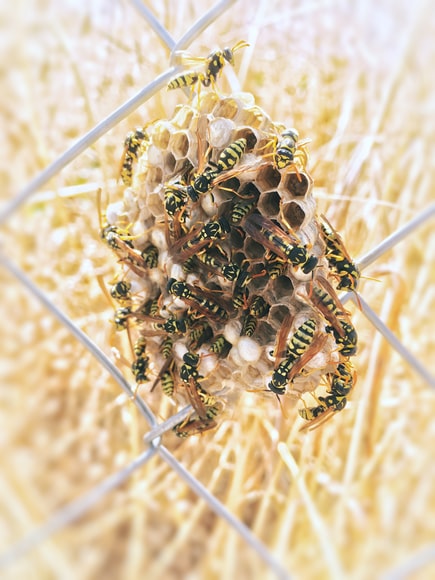Bee breeding is comparable to that of any other livestock species in that it needs constant attention, maintenance, time, skill, and knowledge gained through experience. However, it is an engaging activity that’s a lot less depressing than you might imagine. The main distinction is that bees are wild, non-domesticated creatures. It’s all about forming and nurturing a close relationship with something that appears to exist outside of our everyday lives.
Beekeeping is becoming more critical than ever because bee populations are declining around the world. As a result, small gardeners will need time to add a hive or more to their gardens, roofs, community gardens, and so on. On the other hand, Beekeeping is one way to ensure that birds have plenty of winter food by pollinating their shrubs.
Bee Keeping Details
| Category: Food/Drink, Nature, Outdoors, Physical | Time: <= 30 min | Skill: Some |
| Initial Cost: $$$$ (500+) | Space: lots | People: alone |
| Long-Term Cost: Medium | Makes Money: Yes | Location: outdoor |
Who pursues this hobby?
Beekeeping is challenging to beat if you want to be close to nature. It’s awe-inspiring to see your colony operate as a superorganism to construct comb, nurse and rear young bees, search for food, create honey, defend their territory, bury their dead, expel the drones, and conduct the waggle dance. As a backyard beekeeper, you’ll get a front-row seat to all of this action.
Thousands of individuals want to learn how to keep bees as a hobby. But, of course, who wouldn’t want to appreciate the majesty of a beehive, as well as a jar of honey produced by your bees? But, before you go out and buy that hive, there are a few legal and economic considerations to make about backyard beekeeping as a pastime.
Millennials are increasingly opting for alternative lifestyles, with many returning to farms and off-the-grid communities after years in the city. This is excellent news for bees, who have had a rough time recently. Colony collapse disorder (CCD) has been devastating bee colonies worldwide, and raising bees is getting increasingly difficult.
The hives, as well as the layers of frames that fill them, are made of wood. The foundations of these frames are made of delicate wax paper with a honeycomb design etched on it. To accommodate growing populations and honey shops, hive boxes are piled on top of one another.
Natural hives, or beehives constructed entirely by bees, are frequently discovered in tree holes and, on rare occasions, in the walls of historic structures. Congestion, overcrowding, and even greater congestion cause hives to swarm. Because there aren’t enough empty cells to meet the need, nectar and pollen must be consumed in enormous amounts.
How to start Beekeeping as a hobby?
As a pastime, Beekeeping is ideal since you will consider the bees to be your pets. This pet, on the other hand, is exceptionally low-maintenance and comes with enticing incentives. As I’ve previously stated, Beekeeping exclusively for profit is difficult; therefore, removing that stress from your business can benefit it greatly.
Bees are a godsend if you have a backyard garden or work as a professional farmer. Pollinators are bees. Plants such as squash, cucumbers, apples, melons, and strawberries require them to thrive. They’ll also improve the look of your garden and the surrounding vegetation. Bees are an essential element of our ecosystem.
There are many beekeeping books and resources online available, and knowing everything you can about these beautiful tiny insects can help you get your hives off to a good start. Read all you can get so that when your bees come, you’ll be prepared and know how to care for them.
Let’s take a step back and learn how a hive works and what bees do before you jump in and start purchasing materials. Bees build nests in the wild, fly to flowers to collect nectar, and then the nectar to the hive and comb, where it slowly turns into honey.
The first year of Beekeeping will be spent learning about honey bees, keeping an eye out for pests, and assisting the colony in establishing itself. Your first-year bees will require some time to construct a comb to create and store honey. You may have to leave the majority, if not all, of the honey to feed them through the first winter in colder locations.
Will I earn from Beekeeping?
Bees are beneficial to gardens. So, in addition to being excellent for your garden, they’ll be great for your neighbor’s garden, who could be interested in renting them from you. Farmers rent bee colonies for pollination regularly, which might be a great way to supplement your income. In addition, farmers are prepared to spend a lot of money on bees because they know that having them around will result in a better crop that year.
Do not expect much honey until your second year. Then, you will be able to produce delicious, unprocessed, and unfiltered honey.
You may harvest beeswax in addition to honey. Candles, lip balm, and skin moisturizer may all be made using beeswax. Use it to help drawers glide more freely around the house. Bee pollen is linked to many of the health advantages claimed by honey. It’s been dubbed a superfood because of its antioxidant content. Many health food stores carry it. According to a study published in the National Center for Biotechnology Information, propolis and its extracts “have numerous applications in treating various diseases due to its antiseptic, anti-inflammatory, antioxidant, antibacterial, antimycotic, antifungal, antiulcer, anticancer, and immunomodulatory properties.”
How much would Beekeeping cost me?
A modest hobbyist beekeeping business costs around $1,000 to set up. Although $1,000 may appear to be a large sum to spend on a new interest all at once, consider activities such as skiing or sports fandom. Some sports enthusiasts are ready to spend hundreds of dollars on souvenirs, and I won’t even mention the cost of skiing equipment.
What are the risks of this hobby?
There are things to consider before becoming a beekeeper: You’re going to get stung. Wearing protective gear is an option. You’ll eventually take off the gloves because they’re making you clumsy, or you’ll decide not to wear the bee jacket because it’s too hot.
You might also be walking past the bees at a time when they are incredibly protective. You’re going to get stung. Beekeeping is not a put-it-on-the-backburner pastime. It will need a time commitment that will vary depending on your degree of skill, the size of your bee yard, the time of year, and occasionally unforeseeable occurrences. The most time-consuming parts of the process are educating yourself, putting up your hives, and installing your bees.
Conclusion
Bees require specific nutrients to survive and develop. In addition, they take care of the plants’ nectar and pollen requirements. This is an extension of the last argument, although Beekeeping is unlikely to return your investment for at least a few years. At the same time, you do not expect your bees to produce more than 60 pounds of honey in the first few years. So if you’re looking for rapid results, Beekeeping isn’t the way to go. It will take time to develop as a beekeeper, just as it will take time for your hives to grow in size and strength. Beekeeping is a fantastic adventure, but you’ll need some time to appreciate it.


